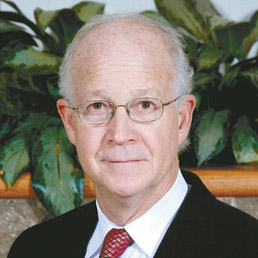Subscriber Benefit
As a subscriber you can listen to articles at work, in the car, or while you work out. Subscribe Now
 FINALIST: Physician
FINALIST: Physician
John W. Fehrenbacher, M.D.
Director of Thoracic Aortic Surgery Program, Indiana University Health
John Fehrenbacher, M.D., a cardiothoracic surgeon, performs one surgery per day, starting around 7 a.m. and often wrapping up after 5 p.m. Wednesdays are reserved for patient follow-ups and new patient consultations. He figures he’s performed nearly 2,000 aneurism surgeries by now, including at least 400 complex thoracic and thoracoabdominal aneurysm surgeries, which are his trademark.
 (Photo submitted)
(Photo submitted)These complicated cases are referred to Fehrenbacher from physicians in Indiana and surrounding states. Fortunately Fehrenbacher, 62, doesn’t shy away from the difficult tasks. “It’s like most things in life,” he said. “The harder you work at it, the more gratifying it is.”
And the better his results get. After surgery, the mortality rate for his patients is 3.1-percent versus the national average of 15 percent. Only 1.7 percent of his patients experience renal failure after the surgeries versus the national average of 12 percent.
He achieves superlative results using Deep Hypothermia and Circulatory Arrest, a specialty procedure he pioneered and perfected. With DHCA, patients are cooled to 15 degrees Celsius, allowing the side branches of the aorta that feed the brain, the kidneys, the spinal cord and other organs and body systems to be temporarily disconnected, restricting blood flow, so the procedure can be performed. If the organs and body systems aren’t reconnected within a certain timeframe, the patient can be paralyzed.
“Developing this technique to do the thoracic and thoracoabdominal aneurysms under hypothermia has probably been my biggest contribution to medicine,” Fehrenbacher said. “It can change the quality of life pretty dramatically in some patients, and in other patients it helps to prolong their lives. It’s very gratifying. I get Christmas cards from people I’ve operated on 10 years ago.”
By the mid- to late ’90s, these complex surgeries had become the focus of his work, but Fehrenbacher pioneered other surgeries in the state earlier in his career: the first lung transplant in 1989, the first heart and lung transplant in 1989 and the first bilateral lung transplant in 1991. In 2003 he was awarded Indiana University’s Teacher of the Year in Surgery. He was listed twice in the Guide to America’s Top Surgeons by Consumer’s Research Council of America.
A “lifelong Hoosier” from Evansville, Fehrenbacher began his career at Indiana University Health in 1983 after earning his degree from the IU School of Medicine. He knew he wanted to be a physician from age seven when he suffered a severe burn and was hospitalized for several months. “I became interested in medicine and in helping people,” he said. “Having a strong work ethic and compassion for people is critical in what I’m doing now.” So is honesty. “Being honest, not only with others, but with yourself … will get you pretty much wherever you want to go,” he said.
Training others to carry on with his work is his priority now. So far he’s trained nearly 20 cardiac surgeons in his DHCA procedure, some from as far away as Japan and Turkey.
“Dr. Fehrenbacher has served in a number of national and regional leadership positions and is recognized by his peers as a tireless advocate of quality outcomes,” said Mary Baker, vice president, Cardiovascular Services, Indiana University Health. “There’s no doubt he has made a lasting impact in the field of Thoracic Aortic Surgery. Without his passion, commitment and vision, many patients would not have gone on to enjoy positive and productive lives.”
Please enable JavaScript to view this content.
